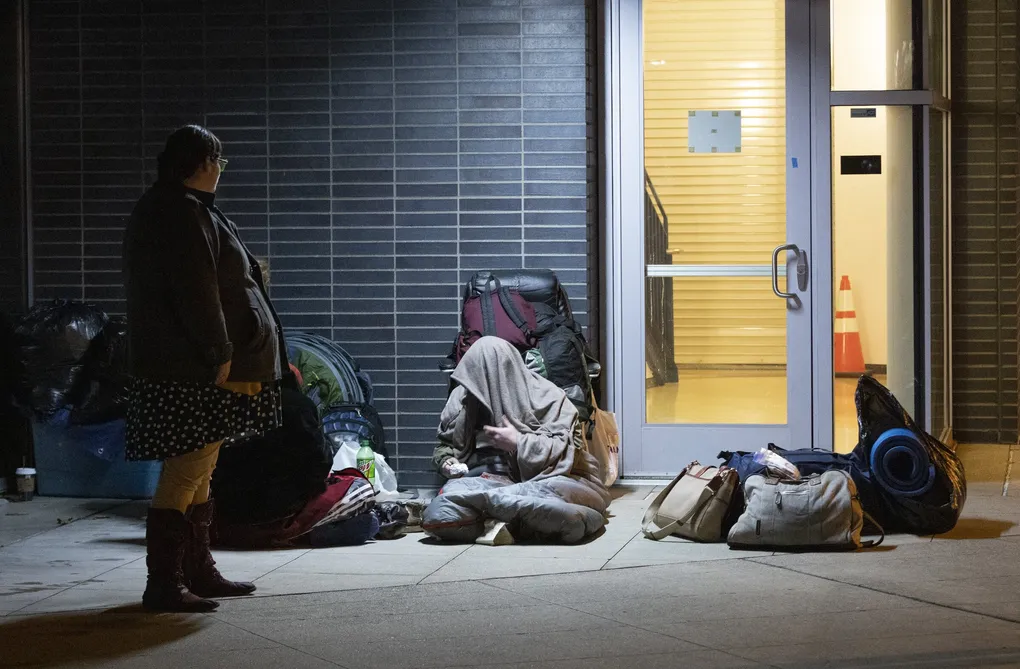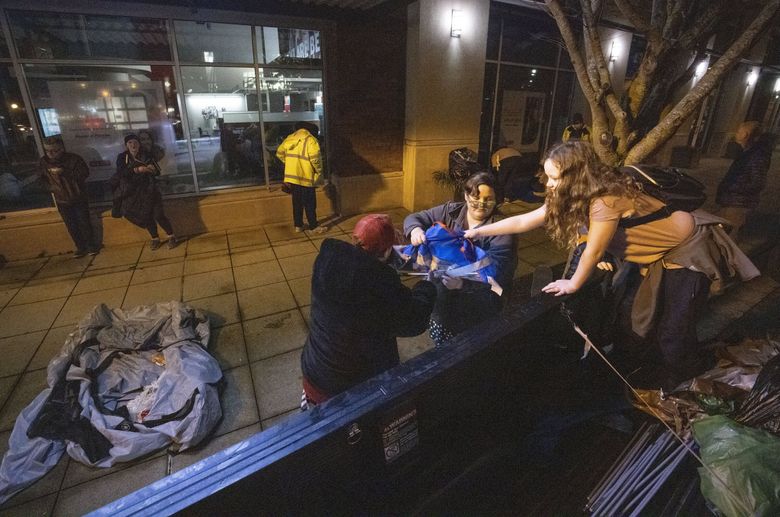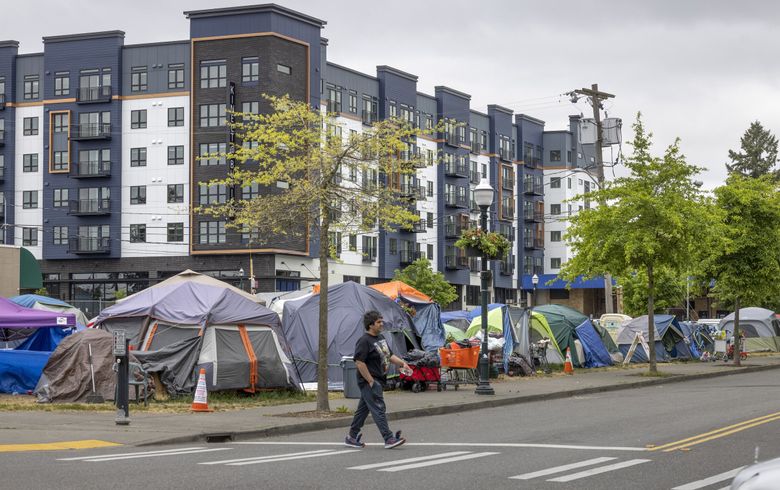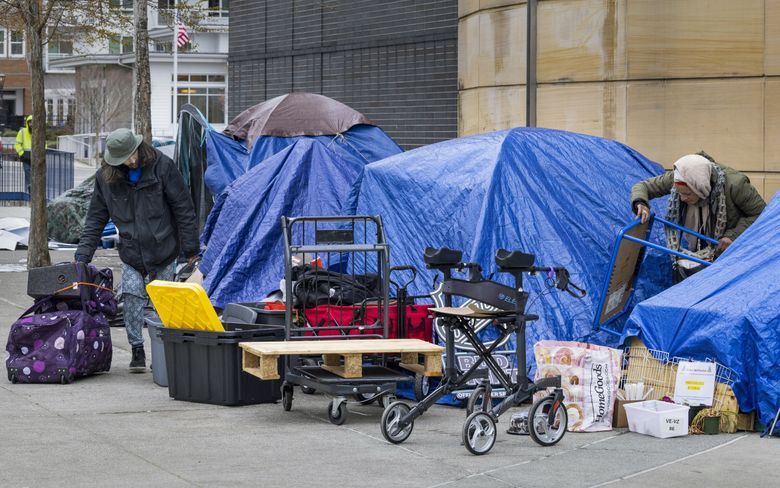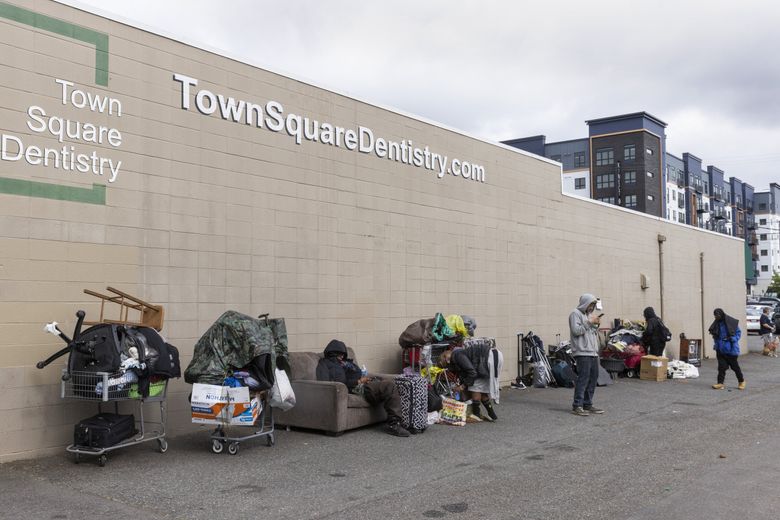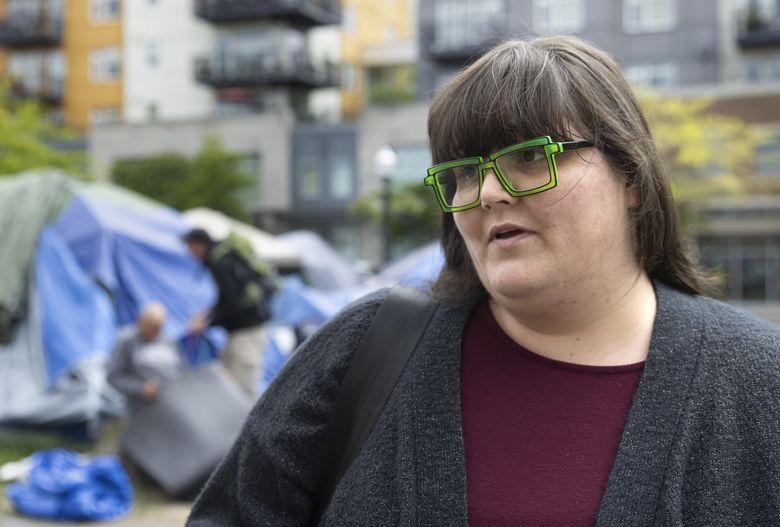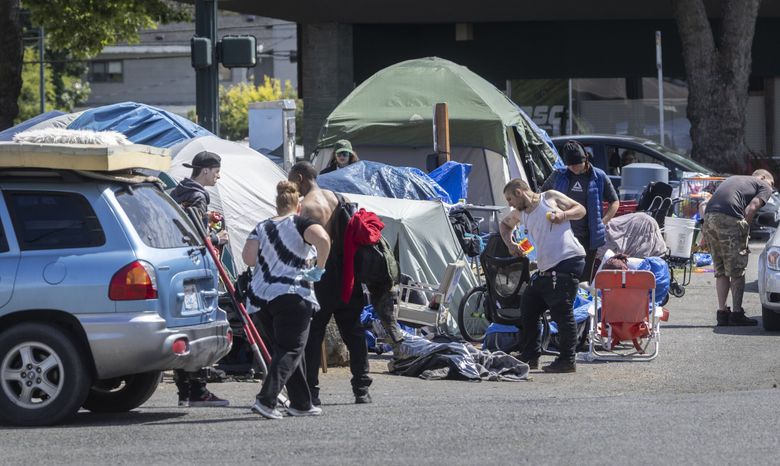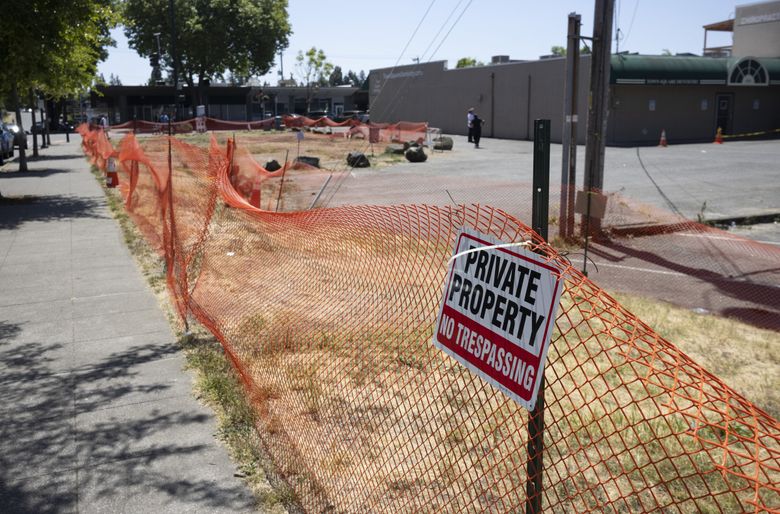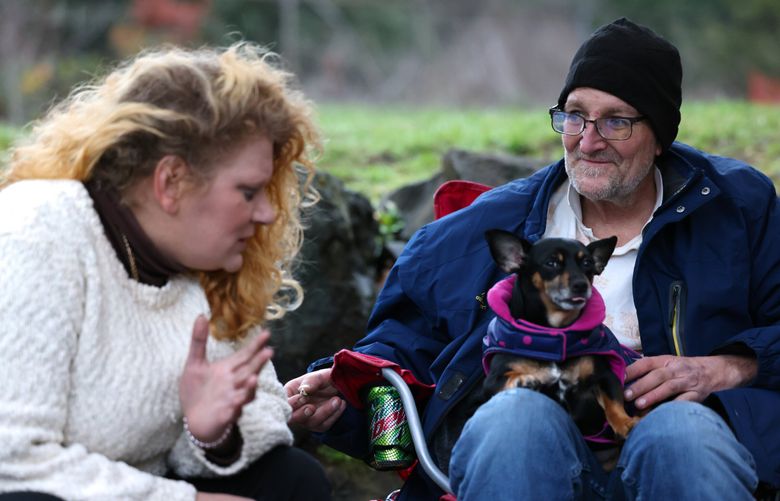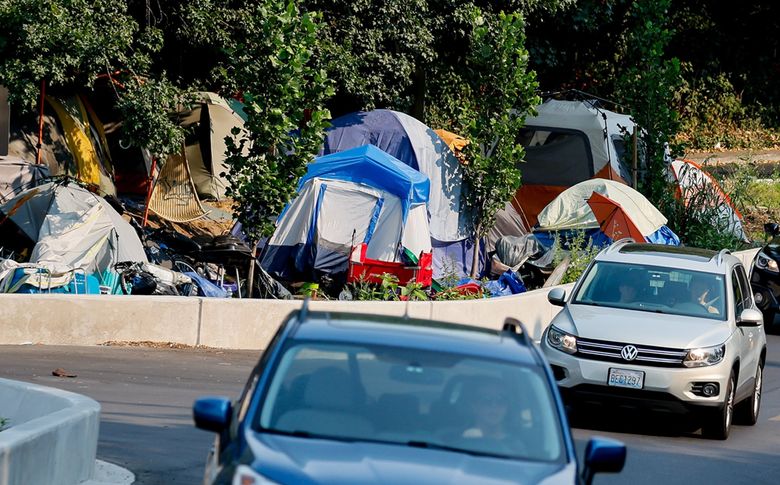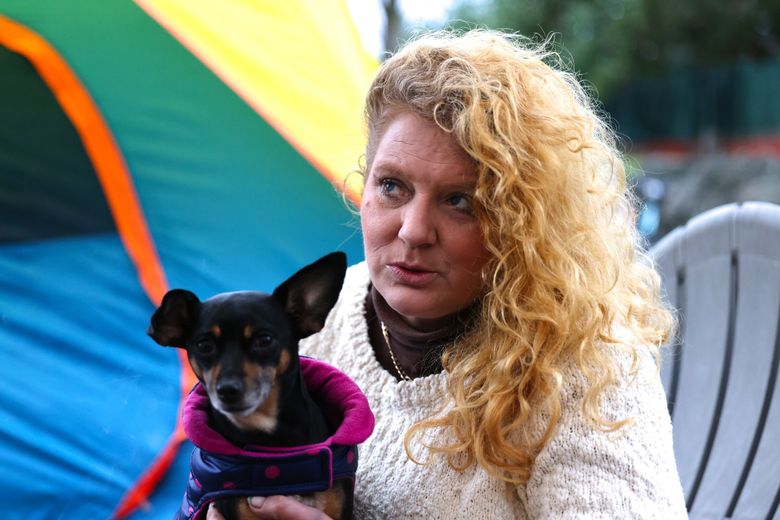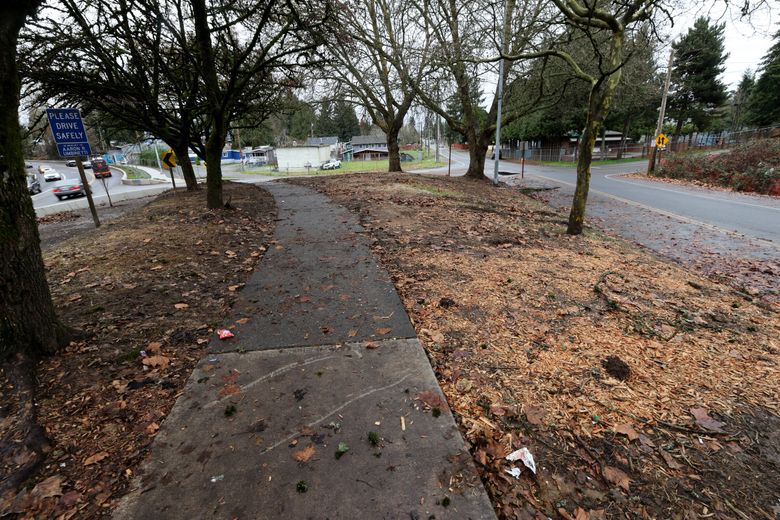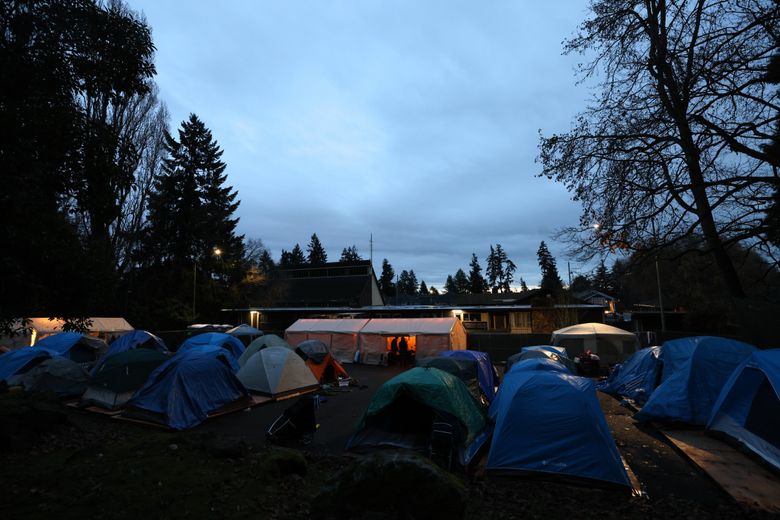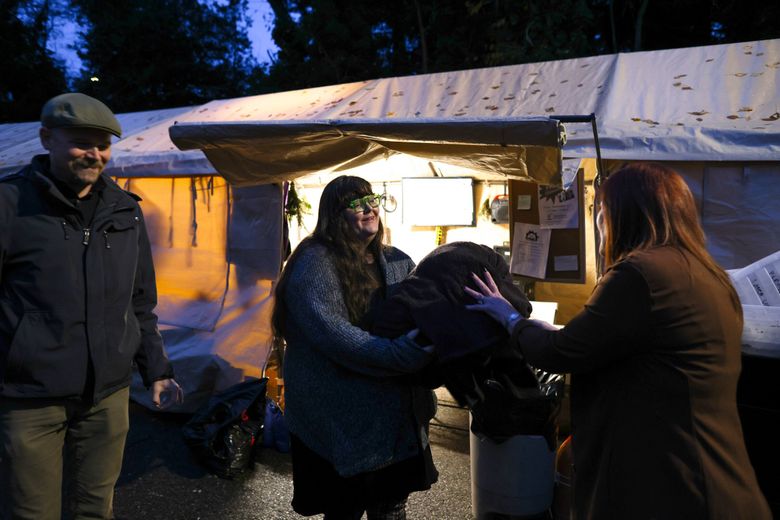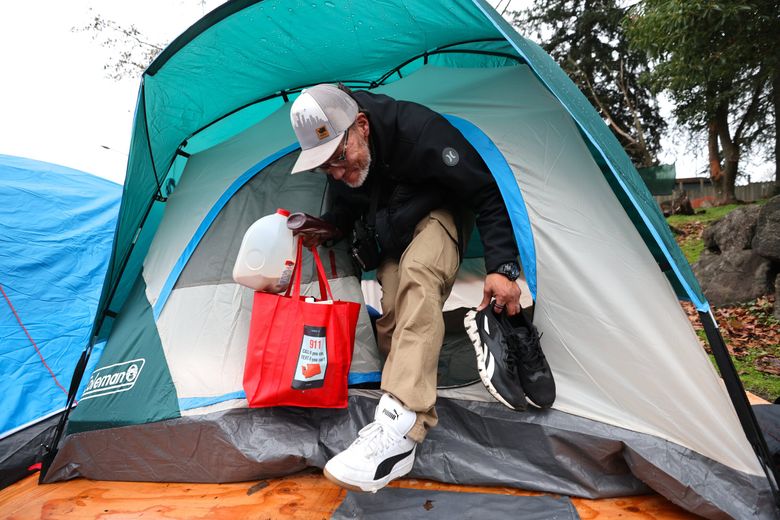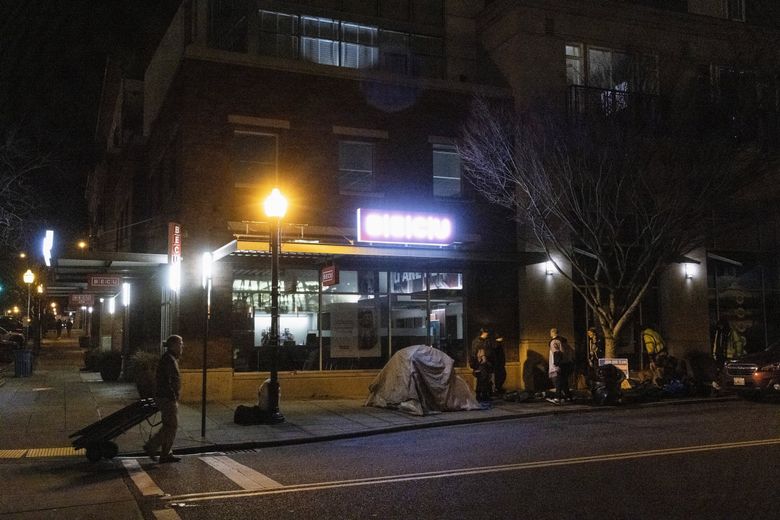It started with just a handful of tents outside Burien City Hall.
In less than a year, the city of Burien went from fretting about how to get people indoors to enacting a strict camping law that makes it nearly impossible to live unsheltered there. The push and pull between long-term solutions to homelessness and short-term actions to relieve frustration and fear has long been the background of homelessness debates.
Indeed, Burien’s story is America’s story on homelessness today.
Cities across King County have introduced or tightened laws around public camping — especially after pandemic-era eviction moratoriums and other rental protections went away — hoping to prevent a visible homelessness presence in their downtowns or to reduce it.
In the midst of new regulations that restrict sleeping in public, cities and states are becoming more punitive in other ways as well.
In Kentucky, the state Legislature is considering a bill that would allow people to use force against homeless people who are camping on private property. In Shawnee, Oklahoma, lawmakers passed an ordinance last year to penalize the feeding of homeless people in its downtown.
While President Joe Biden has directed large amounts of money toward homelessness aid, Democratic leaders along the West Coast, including California Gov. Gavin Newsom, are calling for more freedom to displace and arrest people camping in public. And presidential candidate Donald Trump is saying he wants to take such measures to even greater extremes, proposing to “ban urban camping” and arrest people.
“The nature of the people that we have elected, the time frame of somebody’s tenure in politics, necessarily means that it makes no sense for them to invest in long term solutions,” said Sara Rankin, law professor at Seattle University.
The region is paying extra attention to this South King County city: Homeless residents are suing Burien over the path it chose, setting up a historic case that, if successful, could add protections for unhoused residents and even stop Washington cities from applying camping enforcement all together.
‘Where do they go next?’
For more than 100 years, Burien has been a place for immigrants to settle. Gottlieb Burian, originally from what is now Poland, is the namesake of the 10-square-mile city. Today, more than 20% of Burien’s residents identify as Hispanic or Latino, double King County’s percentage for this group, according to the U.S. Census Bureau.
It is surrounded by paths of migration with planes flying to and from Seatte-Tacoma International Airport on its southeastern border and ships passing by its western border, Puget Sound.
Incorporated in 1993, Burien has grown to more than 50,000 people, offering a more affordable place for people to live that’s just a few miles from Seattle’s city limits.
But a homelessness crisis has tested this small city, coming to a head in the winter of 2023. About 100 to 200 people were homeless in Burien that year, according to the city.
For about a year, up to 30 people lived outside the combined City Hall and library with little interference.
At the beginning of 2023, business owners and residents living in apartments near the encampment started to complain.
Then, there was a fire at the encampment, and officials decided to act.
At an early April council meeting, many City Council members tossed around ideas for how to help people living outside. City Manager Adolfo Bailon shared possible funding sources that could be tapped. They discussed available property to create a sanctioned encampment.
One member asked, “Where do they go next?”
Another asked, “Do we have any plans for how we could potentially relocate them?”
Burien had a law on its books banning camping in parks, so people largely avoided sleeping in those places, said police Chief Ted Boe.
“If you can camp somewhere else, why would you camp where there’s conflict?” he added.
Colleen Brandt-Schluter, head of Burien’s human services department, said at the time that her department’s approach has been “to always lead with services.”
But finding shelter and housing in South King County is hard to do.
Burien’s shelter system can serve up to 159 people: 150 in a family shelter and nine in a women’s shelter.
Across King County, 91% of 5,344 available shelter beds were occupied during the single-night count in January 2023, according to Housing Inventory Count data.
Burien outreach workers have to compete with 38 other King County cities facing their own growing homelessness crises to place residents in one of those beds. And cities that have camping bans but few, if any, shelters rely on this regional stock to be able to enforce them.
Kent and Auburn have passed tough homelessness ordinances after seeing an increase in people living outside in recreational vehicles and tents. Some cities, like Edmonds and Mercer Island, have passed laws to discourage poor people from living there.
So when the 20 or so people in the encampment were shooed away, most picked up their tents and dragged their belongings one block west to a city-owned patch of land, commonly used as a place for dogs to do their business.
The $1 million offer
In May 2023, King County entered the conversation with a possible solution.
It offered Burien officials $1 million — more than double the amount of grant funding Burien has to pay all of its direct-service providers yearly, according to Brandt-Schluter — to create more shelter out of 35 donated shedlike living spaces as complaints kept coming.
Dr. Randy Olson, owner of Town Square Dentistry, located next to the dog-park encampment, told the City Council in mid-May that some of his patients “are fearful of walking past the campers,” and if this encampment forces his office to move, “this could show that the rights of the homeless are superseding the health rights of the Burien citizens.”
These complaints led to more discussions at City Hall about what legal actions a city could take to force encampments to disperse.
A landmark federal case, Martin v. Boise, restricts West Coast cities’ ability to arrest or fine homeless people for living in public if they have nowhere else to go.
Major West Coast cities have become frustrated with Martin v. Boise’s guardrails, so they lobbied for the Supreme Court to take up the issue. The court responded in January, agreeing to hear Johnson v. Grants Pass, a related case that explores homelessness protections.
To receive King County’s $1 million offer, Burien had to select a piece of land within its city limits to site the project.
But leaders couldn’t agree on where or whether they even wanted to say “yes.” They wanted another jurisdiction to bear the burden, another agency to provide the land.
“It’s a shame that King County isn’t offering more,” then-Deputy Mayor Kevin Schilling said in a council meeting in September. He’s now the mayor.
Others argued for swift action.
“I can’t even tell you how many times I have thought about how wonderful that would be to have somebody drop a million dollars in front of you to help the homeless, and we have that right now,” then-Councilmember Cydney Moore said in a July council meeting.
Some council members questioned why the King County Regional Homelessness Authority wasn’t stepping up to help.
The agency was designed to oversee King County’s financial and strategic response to the crisis. If acting as imagined, the authority would help determine how much shelter should be available and dispersed throughout the region.
But more than two years into its life, no South King County cities pay into the agency or contract with it. In fact, only five North King County cities have joined Seattle and King County to hand over homeless services contracts and funding, said Anne Martens, agency spokesperson. This limits the authority’s ability to intervene in situations like Burien’s.
“We don’t have the resources if they’re not given to us,” said Anne Burkland, former chief of staff for the agency.
That hasn’t stopped suburban officials from frustration.
“The thing that we were all expecting [the authority] to do, it’s not doing,” Schilling said.
By the end of May, around 40 tents populated the doggy bathroom lot, some so close together it was hard to see where one ended and the other began.
Burien’s City Council agreed to lease the lot to a local nonprofit that runs an animal shelter. The organization immediately forced the encampment to clear out.
Temperatures rise
Elizabeth and Alex Hale said they lived in an apartment in Burien for about seven years. After Alex lost his job, they paid their rent with savings until the money ran out, Elizabeth said.
Historically, South King County is where people go to buy reasonably priced homes or to rent as Seattle prices rise. But “affordable” is a relative term as the entire region continues to see the cost of living skyrocket.
In early 2014, the average stabilized rent in Burien was $971 per month. By the end of 2023, it was $1,650, according to the Washington Center for Real Estate Research’s Rental Housing Market data, which includes affordable and market-rate rental costs.
The region’s homeless population has grown in parallel. King County’s is one of the largest in the country, with more than 50,000 people estimated to have experienced homelessness at some point in 2022, according to Washington Department of Commerce data.
When the Hales first moved into a tent last year, they tried a few public places in Burien before eventually settling on a grassy median where Ambaum Boulevard Southwest splits into 12th Avenue Southwest in North Burien, yards away from speeding cars.
Anger followed them.
Living on the Ambaum median, Elizabeth Hale said she could feel it. A mortar was thrown by a passerby and exploded at her feet inside her tent, she said.
“The neighborhood, the neighbors really, really got a lot of hatred for us,” Elizabeth said. “Like we were some kind of scum or something.”
In the early stages of Burien’s dilemma, City Councilmember Stephanie Mora proposed a homeless camping ordinance that would create more “no-camping” zones.
As the city played whack-a-mole with encampments, more and more constituents and council members started to demand Mora’s approach.
“I can’t help but feel angry that nothing has been done,” Burien resident Todd Baldwin told council in September. He lives near the Ambaum encampment and reported several issues, including an attempted break-in on his home, hearing multiple gunshots and seeing what he believes was sex trafficking of a minor.
In September, Burien passed a camping ordinance making it a criminal misdemeanor to live or sleep on public property overnight.
The Hales are now suing the city of Burien over this new law, alongside one other homeless person and the Seattle/King County Coalition on Homelessness, claiming the ordinance “banishes” homeless people and inflicts “cruel punishment” that violates the Washington Constitution.
On Nov. 27, with just hours to go before King County’s $1 million offer ran out, Burien’s City Council agreed on a piece of property. The council selected property it doesn’t own, so several steps remain before a contract can be signed, according to the city of Seattle.
On Dec. 1, Burien cleared the median encampment using its new anti-camping law. The city brought in a front-end loader to smooth out the land and pick up items from the ground.
Full circle
This time, the Hales had somewhere to go to.
In November, then-Councilmember Moore helped open an encampment at the Oasis Home Church to offer people somewhere safe to go and to counter the lack of action from the council.
“Burien has shuffled people from place to place and swept them without giving them any options for shelter or a location where they could land,” Moore said Monday, standing at the entrance to the gated camp.
Volunteers placed tents in orderly rows in a parking lot behind the church. They erected fencing and canopies. Volunteers added outdoor heaters and supplied Cup Noodles.
Sixty-five people lived there at its peak, after passing a background check and agreeing to no drug or alcohol use on property.
“It’s like home. You can actually relax,” Elizabeth said in December. “I feel safe here, really safe.”
That month, 40 of the encampment’s current and former residents said they last lived in Burien.
The respite was short-lived.
On Monday, the encampment’s three-month lease ran out at Oasis Home Church. Volunteers sent out messages, pleading with the community to help them find another piece of property.
But nothing materialized.
So, Alex and Elizabeth Hale headed back to downtown.
They set up tents on the sidewalk opposite Burien’s City Hall, yards away from where it all began.




